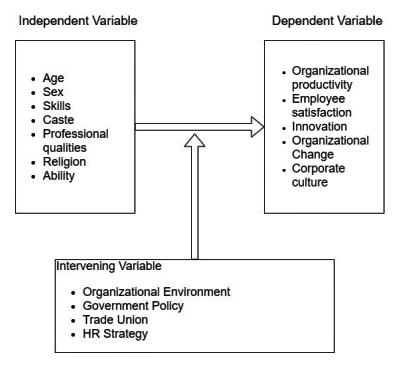Diversity is generally defined as acknowledging, understanding, accepting, valuing & celebrating differences among people with respect to age, class, and ethnicity, and gender, physical &mental ability. Over the past decade the work force in industrialized countries has become increasingly heterogeneous. These countries are spending huge amount for diversifying the workforce. Thus, diversity is increasingly recognized & utilized as an important organizational resource in regards to whether the goal is to be an employer of choice to provide an excellent customer service or to maintain a competitive edge.
According to Dahm (2003), diversity within an organization can evoke an array of emotions. Many researchers view diversity as something to be dealt with rather than a tool to be used to improve the organizations. Even though many researchers agree that the results of diversity conscious organizations add value to their performance.
Workforce diversity influence many more other factors:
Internal factors:
Internal environmental factors are such types of factors which can be controlled and managed internally. Organizational policy, rules, culture, resources and employee themselves are some important internal factors.
External factors:
External environmental factors are those types of factors which cannot be controlled by organization. Customers, pressure group, government, suppliers, creditors, distributors, trade union are main environmental factors of diversity. Educational background, religion, habits, experience, unions and marital status are also external factors which direct effect in workforce diversity in organization.
Organizational factors:
Organizational factors are those types of factors which directly effect on workforce diversity. It comprises position, post, location, department, division, financial, technological, cultural strategies and understanding about diversity.
Advantages:
Resource Acquisition Argument
As sources of labor become increasingly diverse, firms that are able to hire, retain and effectively utilize workers from all social-cultural backgrounds may gain an advantage in human assets over firms that less effectively meet their diversity goals.
Cost Argument
Given the reality of diversity in workgroups, failure to manage the special challenges that it presents may lead to higher cost structures for firms by contributing to higher employee turnover, higher interpersonal conflict, and more miscommunication.
Marketing Argument
By tapping the insights and understanding of people of different cultures, genders, ethnic groups, etc., firms may gain advantages in designing and selling products and services to a culturally diverse marketplace.
Problem-Solving Argument
Diverse perspectives create a potential for better problem solving in workforces that are culturally diverse. These advantages should be observable in recognizing and defining problems as well as in generating useful solutions.
Creativity Argument
Human diversity in workgroups creates a richer flow of ideas and thus has the potential to increase creativity and innovation; this, in turn, can improve organizational financial performance.
Values Argument
Organizations seek to perform on a diverse set of measures, including integrity on stated core values such as fair and respectful treatment of all members and/or promotion of equal employment opportunities in the broader society. Firms must be proactive in managing diversity in order to honor these values.
Conceptual framework

Workforce diversity plays an important role in organizational change and performance. It enhances employee’s capacity and build new image by gathering with diverse people. When people from different caste, sex, religion, ability, geographical region, age, different perception and attitude and professional background come together in an organization, it enables multiple ideas and better solution of problem at work ultimately improving employee and organizational performance. Diversity builds a positive image and reputation of the organization in both internal and foreign market. So, based on this fact, researcher has some recommendation to policy makers and senior personality of Government, workforce diversity is an important aspect of recruitment and selection of talent mixture steering business growth and organizational change rather than legal mandatory.


